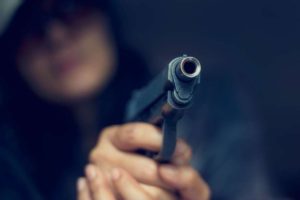 The House this morning did not concur in the Senate changes to HB 2186 (a House judiciary bill turned into a Senate school finance bill) and so a conference committee has now been formed. This action allows the work of putting together what will likely be the last school finance bill of the regular session.
The House this morning did not concur in the Senate changes to HB 2186 (a House judiciary bill turned into a Senate school finance bill) and so a conference committee has now been formed. This action allows the work of putting together what will likely be the last school finance bill of the regular session.
With the Senate embroiled in a gun bill debate, the conference committee plans to meet today. It may be just a preliminary meeting as the House will reconvene at 5:00 to take up the newly passed gun bill.
Now, about that gun bill…
The Senate debated Senate Sub for House Bill 2278 which would allow state hospitals to ban firearms. This issue has been a hot topic all session and wrapped up in it additionally have been attempts also to allow colleges to ban firearms. The Governor and hard right conservatives passed a law a few years ago that opened essentially every public area in the state – colleges, municipal buildings, state hospitals, etc. – along with “constitutional carry” that allows the carrying of concealed firearms without a permit or training (although both still exist).
The law prohibits state hospitals from disallowing weapons on their premises unless all entrances are secured with metal detectors and security personnel. The cost for such security exceeds $24 million annually. It wasn’t until the Governor learned of these costs that there was a sudden cry to change the law as it relates to hospitals. Sadly, the Governor and his NRA allies have no concern whatsoever about the cost to colleges and universities, so adding colleges to the bill protecting hospitals would jeopardize the attempt to help the hospitals.
The bill came to the floor with only the change for hospitals and a plea from Senator McGinn (R-Sedgwick), who was carrying the bill on the floor, to please not add amendments for fear of losing the bill entirely. Supporters of banning guns from colleges agreed to support the bill as-is while noting their desire to take the fight for colleges forward.
Of course, the NRA objected strongly to banning weapons from our state mental hospitals but sensing support for the effort, NRA lobbyists wrote an amendment that would allow guns in the hospital parking lots and reception areas. Further, the NRA amendment would require that, if a hospital wished to ban guns beyond reception, it would have to provide secure gun lockers. Senator Susan Wagle (R-Wichita) offered the NRA amendment and remarkably in her closing remarks actually said, “The NRA chose to allow us” to adopt their amendment.
The Senate rallied behind Senator McGinn and the hospitals and defeated the NRA-written amendment on a vote of 16 to 24.
Senator Masterson (R-Andover) then offered an amendment to allow colleges to ban firearms also noting when questioned, that he would not support such an amendment. This was a cynical offer, intended to get supporters of the colleges to vote against the amendment to protect the underlying bill. Alternatively, Masterson was working from the knowledge that if the amendment were approved, the underlying bill would likely be defeated or vetoed and the NRA would carry the day. The Masterson amendment failed on a vote of 5 to 29.
Senator Alley (R-Arkansas City) offered an amendment to get gun safety programs based on the NRA’s “Eddie Eagle” program into Kansas public schools. His amendment was ruled non-germane and so was not considered.
As the debate was winding down, Senator Olson (R-Olathe) made the argument that everyone should be allowed to carry guns anywhere they want whenever they want on the off chance that a bad guy might be there. He made the point that he thought this happened once in his district back in 1985 although he wasn’t entirely sure, but someone had told him. And for the second time, he asserted that these killings only happen in “gun-free” zones because the bad guys wander the streets looking for “no guns” signs. He also explained that people die in KU Med all the time.
Olson then made a motion to dual refer the bill back to both Ways and Means and Federal and State Affairs, Fed and State Affairs being a more NRA-friendly committee. This tactic is often used to kill a bill. Both committees have to send it back to the floor, and it is sent to one that just won’t act. Olson’s motion failed on a vote of 11 to 27.
Senator Pilcher-Cook offered an amendment to prohibit colleges from adopting any regulations regarding guns or ammunition. They could, she said, put up signs telling students it might not be a good idea to carry ammo into a lab where it could explode. This amendment failed on a voice vote.
The bill was approved on a final action vote and upon final action- done immediately- the bill was passed by a vote of 24 to 16.
KNEA supports a safe learning environment for all students. Part of this is allowing the colleges and universities to make the determination about the carrying of weapons for themselves and in the best interests of their students, staff, and community.


